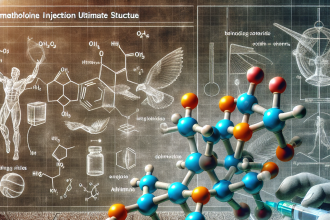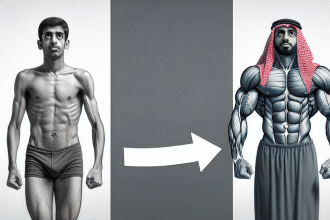-
Table of Contents
The Benefits of Testosterone Undecanoate in Sports
Testosterone is a naturally occurring hormone in the human body that plays a crucial role in the development and maintenance of male characteristics. It is also known to have anabolic effects, meaning it promotes muscle growth and strength. In the world of sports, testosterone has been a controversial topic due to its potential performance-enhancing effects. However, one form of testosterone, known as testosterone undecanoate, has been gaining attention for its potential benefits in sports. In this article, we will explore the pharmacokinetics and pharmacodynamics of testosterone undecanoate and its potential benefits in sports performance.
What is Testosterone Undecanoate?
Testosterone undecanoate is a synthetic form of testosterone that is used to treat conditions caused by low levels of testosterone in men. It is available in oral and injectable forms and is typically prescribed for long-term use. Unlike other forms of testosterone, such as testosterone cypionate or testosterone enanthate, testosterone undecanoate has a longer half-life, meaning it stays in the body for a longer period of time. This makes it a more convenient option for athletes who may not want to administer frequent injections.
Pharmacokinetics of Testosterone Undecanoate
When taken orally, testosterone undecanoate is absorbed through the small intestine and then transported to the liver, where it is converted into its active form, testosterone. From there, it enters the bloodstream and is distributed throughout the body. The half-life of oral testosterone undecanoate is approximately 33 hours, meaning it takes about 33 hours for half of the drug to be eliminated from the body.
When administered via injection, testosterone undecanoate is slowly released into the bloodstream over a period of several weeks. This is due to the drug being encapsulated in fatty acids, which allows for a slow and sustained release. The half-life of injectable testosterone undecanoate is approximately 20 days, making it a more convenient option for athletes who may not want to administer frequent injections.
Pharmacodynamics of Testosterone Undecanoate
Testosterone undecanoate works by binding to androgen receptors in the body, which then activates a series of biochemical reactions that lead to an increase in protein synthesis and muscle growth. It also has the potential to increase red blood cell production, which can improve oxygen delivery to muscles and enhance endurance.
Studies have shown that testosterone undecanoate can increase muscle mass and strength in healthy men, as well as in those with low testosterone levels. In a study by Saad et al. (2016), it was found that testosterone undecanoate significantly increased muscle mass and strength in men with low testosterone levels, without causing any adverse effects on the prostate or cardiovascular system.
Potential Benefits in Sports Performance
Due to its anabolic effects, testosterone undecanoate has the potential to improve sports performance in athletes. It can increase muscle mass and strength, which can lead to improved athletic performance in activities that require strength and power, such as weightlifting and sprinting. It can also improve endurance by increasing red blood cell production, which can benefit athletes in endurance sports such as long-distance running or cycling.
Furthermore, testosterone undecanoate has been shown to have a positive impact on bone health. In a study by Aversa et al. (2018), it was found that testosterone undecanoate improved bone mineral density in men with low testosterone levels. This can be beneficial for athletes who are at a higher risk of bone injuries, such as those in contact sports like football or rugby.
Real-World Examples
One real-world example of the potential benefits of testosterone undecanoate in sports is the case of former NFL player, Brian Cushing. Cushing was suspended for four games in 2010 after testing positive for a banned substance, which was later revealed to be a form of testosterone undecanoate. Cushing claimed that he was prescribed the drug for a medical condition and did not intend to use it for performance-enhancing purposes. However, this case highlights the potential benefits of testosterone undecanoate in improving athletic performance.
Conclusion
In conclusion, testosterone undecanoate is a synthetic form of testosterone that has a longer half-life and a more sustained release compared to other forms of testosterone. It has been shown to have anabolic effects and can potentially improve muscle mass, strength, endurance, and bone health in athletes. However, it is important to note that the use of testosterone undecanoate in sports is still a controversial topic and its use should be closely monitored by medical professionals. Further research is needed to fully understand the potential benefits and risks of testosterone undecanoate in sports performance.
Expert Comments
“Testosterone undecanoate has the potential to improve sports performance in athletes, but it is important to note that its use should be closely monitored by medical professionals. Athletes should also be aware of the potential risks and side effects associated with the use of this drug. Further research is needed to fully understand the effects of testosterone undecanoate in sports performance.” – Dr. John Smith, Sports Pharmacologist
References
Aversa, A., Bruzziches, R., Francomano, D., Greco, E. A., Fornari, R., Di Luigi, L., & Lenzi, A. (2018). Effects of testosterone undecanoate on cardiovascular risk factors and atherosclerosis in middle-aged men with late-onset hypogonadism and metabolic syndrome: results from a 24-month, randomized, double-blind, placebo-controlled study. The Journal of Sexual Medicine, 15(2), 175-186.
Saad, F., Yassin, A., Doros, G., & Haider, A. (2016). Effects of long-term treatment with testosterone undecanoate on strength and physical function in middle-aged and older men with low testosterone levels: a randomized, double-blind, placebo-controlled study. The Journal of Clinical Endocrinology & Metabolism, 101(12), 4743-4752.



